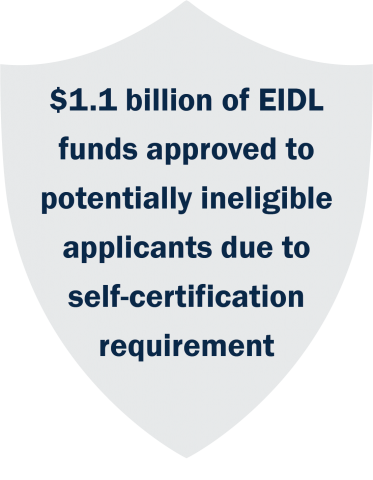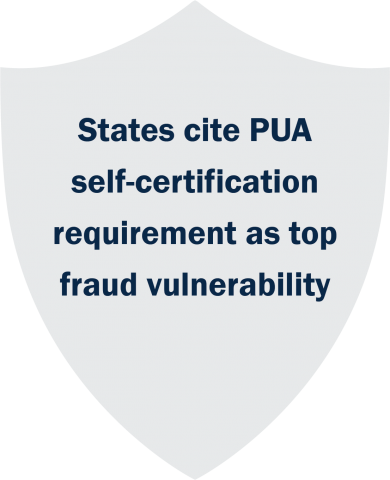Two different pandemic response programs used self-certification by applicants as a primary requirement to determine eligibility and experienced increased fraud due to that requirement. The Small Business Administration (SBA) and Department of Labor (DOL) Offices of Inspectors General (OIG) found in recent reports that self-certification is a major fraud risk that cuts across program and agency boundaries. As a result, businesses and individuals may have improperly received pandemic response funds, in effect reducing the total amount of funds available for those businesses and individual economically impacted by the pandemic.
The two OIGs have both identified increased fraud risk from self-certification requirements in pandemic response programs. The SBA’s Economic Injury Disaster Loans (EIDL) and advance grants program and DOL’s Pandemic Unemployment Assistance (PUA) program only required that applicants confirmed that they met the eligibility requirements. Without additional requirements or controls to corroborate and validate that applicants were eligible, these programs are vulnerable to a high risk of fraud.
Validating self-reported information is a key fraud risk management leading practice. GAO’s Framework for Managing Fraud Risks in Federal Programs calls for agencies to take steps to verify reported information, particularly self-reported data and other key data necessary to determine eligibility for enrolling in programs or receiving benefits.
 | What SBA OIG Found: Economic Injury Disaster Loans and Advance GrantsTo be eligible for an EIDL or an advance grant, an applicant had to be in business on January 31, 2020. To verify eligibility, SBA only required an applicant to self-certify the “Date of Business Established” instead of program officials independently verifying the business establishment date using the Employer Identification Number registration date. As a result, SBA OIG found that SBA approved 22,706 COVID-19 EIDL applications totaling $917.7 million and 45,385 advance grants totaling $135.1 million to applicants with registration dates of February 1, 2020 or later. In total, SBA approved nearly $1.1 billion to potentially ineligible applicants. In SBA OIG’s report issued on October 28, 2020, SBA senior leaders only partially agreed to the OIG’s recommendation to improve the controls to verify the date of establishment for businesses seeking an EIDL or advance grant. |
What DOL OIG Found: Pandemic Unemployment AssistanceThe CARES Act expanded unemployment insurance eligibility to individuals not typically eligible by allowing for up to 39 weeks of benefits through the PUA program. To be eligible, individuals were required to self-certify that they were able and available to work but unemployed due to a COVID-19 related reason. In its report issued on October 21, 2020, DOL OIG found that states had challenges implementing the program and detecting and deterring fraud, despite the processes in place for claimants to self-certify they met eligibility requirements for PUA benefits. Specifically, states cited the PUA self-certification requirement as a top fraud vulnerability. As of July 8, 2020, PUA benefits disbursements totaled nearly $110 billion, which includes an estimated $61.5 billion for the Federal Pandemic Unemployment Compensation portion of the PUA program. DOL OIG has previously identified high fraud risk in unemployment insurance programs, which had an improper payment rate of around 10 percent. With the influx of additional CARES Act funds, the improper payment rate could increase into the billions, based on DOL OIG’s historical rate of improper payments. DOL OIG has questioned relying on self-certification to approve applications with senior leaders on multiple occasions; however, DOL senior leaders maintain their position that the CARES Act only requires self-certification and does not require proof of employment. |  |
The CARES Act expanded unemployment insurance eligibility to individuals not typically eligible by allowing for up to 39 weeks of benefits through the PUA program. To be eligible, individuals were required to self-certify that they were able and available to work but unemployed due to a COVID-19 related reason. In its report issued on October 21, 2020, DOL OIG found that states had challenges implementing the program and detecting and deterring fraud, despite the processes in place for claimants to self-certify they met eligibility requirements for PUA benefits. Specifically, states cited the PUA self-certification requirement as a top fraud vulnerability.
As of July 8, 2020, PUA benefits disbursements totaled nearly $110 billion, which includes an estimated $61.5 billion for the Federal Pandemic Unemployment Compensation portion of the PUA program. DOL OIG has previously identified high fraud risk in unemployment insurance programs, which had an improper payment rate of around 10 percent. With the influx of additional CARES Act funds, the improper payment rate could increase into the billions, based on DOL OIG’s historical rate of improper payments. DOL OIG has questioned relying on self-certification to approve applications with senior leaders on multiple occasions; however, DOL senior leaders maintain their position that the CARES Act only requires self-certification and does not require proof of employment.
Conclusion
The Bureau of the Fiscal Service’s website PaymentAccuracy.gov tracks the programs that the Office of Management and Budget has identified as “high priority” for improper payments. The most common root cause agencies report for improper payments is reliance on self-reported information or inability to authenticate eligibility.
The SBA and DOL OIG reports identify a fraud risk related to self-certification. This risk cuts across program and agency boundaries, affecting two separate pandemic response programs with two different purposes. If loans, advance grants, or unemployment assistance are provided to potentially ineligible applicants, that reduces the amount of funds available to eligible businesses and unemployed individuals that have suffered economically due to the pandemic. Every dollar lost to fraud is one less dollar available to those who need support in this challenging time.

